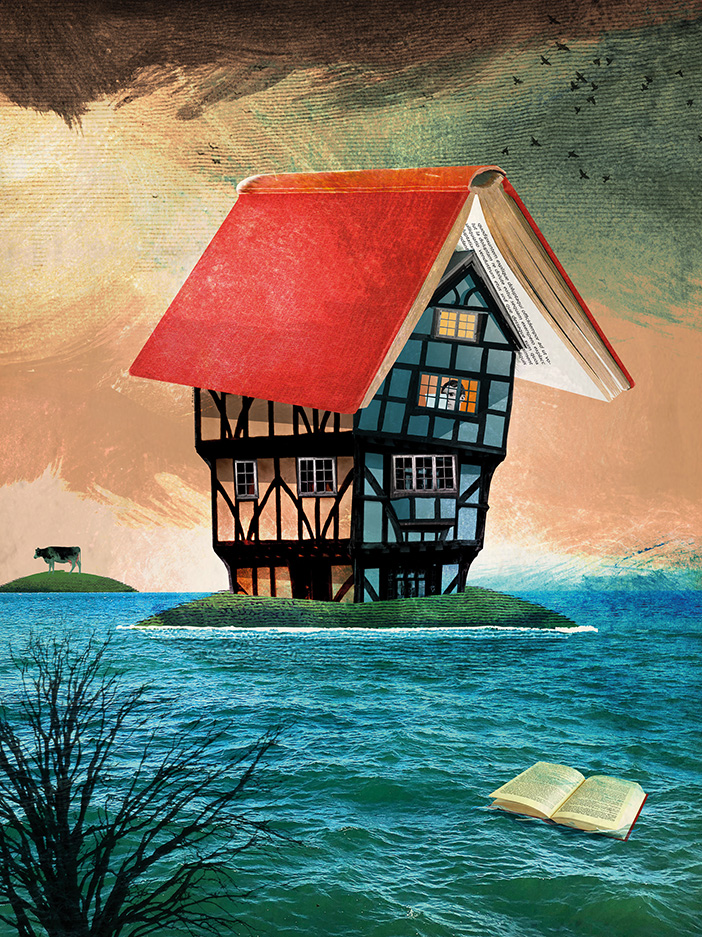By Christopher Tayler
Copyright newstatesman

Ten years ago, the novelist Amitav Ghosh gave a series of lectures at the University of Chicago about the way writers of fiction were handling the climate crisis. If urgency is the same thing as seriousness, Ghosh said, you’d expect climate change to be the main preoccupation of serious writers the world over. But that was “very far from being the case”. In fact, climate change barely featured in literary fiction. Ghosh’s lectures, later published as The Great Derangement, offered an explanation – and condemnation – of this state of affairs.
The landscape has become more hospitable to “cli-fi” since. In What We Can Know, Ian McEwan has just published his second novel about climate change (his first, Solar, came out 15 years ago). And it’s true there was a circular quality to some of Ghosh’s arguments, which rested on a definition of serious writing that excluded speculative fiction. Ghosh’s point, however, wasn’t that the likes of Octavia Butler, Kim Stanley Robinson and Ursula K Le Guin don’t count. Efforts to ignore them have impoverished the mainstream, he said. His bigger point was that what he saw as the normative novel form – the novel of illusionistic realism, inherited from Defoe, Richardson, Austen, Flaubert, Tolstoy and so on – is at best badly suited to thinking about climate change, and at worst an active participant in “a concealment of the real”.
How do realist novels conceal the real? In Ghosh’s telling, the problem starts with their evolution in the 18th and 19th centuries as the signature literary form of Europe’s mercantile middle class – a class whose prosperity and confidence (and demand for reading material) were themselves products of a rapidly carbonising economy. Unlike epic, romance, or the tale of wonders, which string together heightened moments and leave out the boring bits, the novel came to specialise in the mundane. Novelists learned to counterpoint their plots’ dramatic turning points with detailed descriptions of everyday existence, offering a new “kind of narrative pleasure”, in the words of the critic Franco Moretti, “compatible with the new regularity of bourgeois life”. The new mathematics of probability, and then the new science of statistics, found a counterpart, too, in the realist novel’s distaste for wild, unmotivated events.
At the centre of these new kinds of stories, Ghosh says, there was also a new kind of character: the sovereign individual, whose ethical and/or emotional choices would give the novel its primary subject. As a vehicle for the representation of character, consciousness and the texture of daily life, this new form was hard to beat. But, according to Ghosh, when it comes to thinking about climate change, these strengths turn out to be weaknesses. Novels are good at dealing with the rhythms of human lives, but less good at dealing with planetary timescales. Seemingly unusual occurrences – extreme weather events, say – interfere with the novel’s “calculus of probability”, and also have an unhelpful tendency to turn into metaphors. Above all, a form devoted to “individual moral adventure” isn’t well adapted to thinking about a collective-action problem like climate change, in which individual choices are more or less meaningless.
You could quarrel with various details here – literature that’s “radically centred on the human”, for example, may have arrived with literate humans rather than realist novels – but it’s difficult to argue with the general diagnosis, which could be extended, too, in a couple of directions.
First, apocalyptic dread is as old as history. It seems to be a “peculiarity of our imagination”, the critic Frank Kermode observed long ago, “that it chooses always to be at the end of an era”, and, as a result, a countervailing scepticism is also built into this pattern of thought. All previous predictions of global doom have been falsified – why not this one? And doesn’t this or that imagined apocalypse look suspiciously like a metaphor for the writer’s own mortality, or for changes in the culture in which the writer grew up?
Second, although there are, of course, campaigning fictions, a resistance to preachiness is part of the novel form. What we tend to think of as the wisdom of a novel – or, for that matter, of Shakespeare or Thucydides – has more to do with a higher-order interplay of contrasting points of view than it does with paraphraseable wisdom as such. One of the things that makes Anna Karenina a great novel is Tolstoy’s sympathetic identification with characters he disapproves of morally and intellectually, starting with Anna herself. When Tolstoy drops his masks and starts explaining the meaning of life, we’re less interested. Novelists are expected to put their own most passionately held beliefs under pressure. If they do that too mechanically, however, there’s a danger we’ll accuse them of having nothing to say, or of being like a news report that gives too much weight to, say, climate change denial, in the name of balance.
Ian McEwan – the de facto laureate of British fiction, and the only living English writer who’s commended in The Great Derangement for trying to tackle climate change – has been thinking about these problems for a while. Fitting moments of life-changing horror into measured psychological realism is McEwan’s raison d’être, and he’s an old hand at balancing a rationalistic, scientistic world-view against a tendency to gothic imaginative excess.
When future generations look back on our times, Ghosh says, they may blame artists and writers as well as politicians. That’s pretty much what happens in What We Can Know, and both the blame and the terms of argument are strikingly reminiscent of Ghosh’s. A character in the year 2120 is writing a monograph on the “crisis in realism in fiction between 2015 and 2030” – a period known in the novel’s future as “the Derangement”, when close attention to “the mundane, the personal and the assumed continuity of everyday life” didn’t cut it any more.
Britain in 2120 is a “sleepy overlooked archipelago-republic” and a cultural province of Nigeria, the only country with the resources to keep the global internet running and have exportable pop music and fashion. Rising sea levels and tsunamis caused by nuclear exchanges, triggered by badly calibrated AI, have drowned the world’s major cities. The US has descended into warlordism; Germany is part of Greater Russia. In England, where windows have shrunk to Tudor sizes thanks to the cost of glass (the novel is filled with great little details like that), electric ferries crawl silently over the Straits of Swindon. Some things never change, however: “Cut off from the rest of us and… large and varied enough as a faction that they didn’t even think of themselves in those terms”, people from a handful of elite schools and universities still run the country.
Other things that haven’t changed, requiring a certain amount of special pleading, include humanities academia and the English language. Tom Metcalfe, who narrates the first two-thirds of the book, teaches English literature at the University of the South Downs. His special subject is an English poet called Francis Blundy (1950-2017), apparently “second only to Seamus Heaney” and thought by some to rank with TS Eliot. Posterity is especially interested in Blundy because of his unpublished sonnet sequence “A Corona for Vivien”, which was read out once, at a birthday dinner for his younger wife, Vivien, in 2014, then mysteriously disappeared. The dinner guests’ hazy recollections of a dazzling encomium to the natural world made Blundy a cult figure for environmentalists in the 2030s, when “the Derangement” began to give way to “the Inundation”.
Tom – who’s not so secretly in love with the idea of Vivien and the world of abundance she inhabited – is writing a speculative reconstruction of the now-famous dinner in 2014. Following clues in the Blundy archive in the Bodleian Library, now located in Snowdonia, he gets wind of a manuscript that might be buried on an island in what’s left of the Cotswolds. Will he manage to get his hands on the poem itself? It wouldn’t be fair to give away much more of the plot, which is paid out with such elegance and expertise that the mild preposterousness of some of it barely registers. Still, McEwan brings off a large-scale narrative turnaround of the kind he managed in Atonement and Sweet Tooth, maintaining tension via sex and violence among ageing grandees without quite falling into the uncertainly comic mode of Amsterdam (1998) and Nutshell (2016).
Although it’s hard to believe in an unpublished poem setting off a media frenzy, it’s easier to see how McEwan could imagine it when you consider the expectations that attended Solar, his first foray into climate fiction, in 2010. This was certain to “become a key text in any ecocritical reading list”, one academic predicted a year before it was published. In the event, it was widely felt to be a disappointment. Ghosh reproves it as a “lapse into satire”, and it’s true that McEwan’s patient story-engineering works better when he’s keeping a straight face. But perhaps the real problem was the lack of a counter-subject beyond the climate-scientist antihero’s ironically self-destructive overconsumption. What We Can Know doesn’t make the same mistake: it’s as much a novel about what posterity will make of us – especially those of us who are world-famous literary figures – when it has access to everything we did on our phones.
On this, the novel is mildly optimistic: biographers will get our dirty secrets badly wrong unless we choose to help them. And there’s a similar note of mild optimism on the climate change side of the ledger. Humanity will muddle through; there will be moments of happiness as well as lowered life expectancy and terrible food; and posterity will be too busy with its own concerns to brood on our shortcomings for very long.
You could say that McEwan engages with Ghosh’s arguments without following all his prescriptions. But by ending the book with a first-person confession from our own times, which the reader can’t help but read through Tom’s eyes, he’s found a way to estrange our mundane present from the future’s perspective without anything overtly science-fictional happening on the page. It’s a clever, uncanny effect that Tom, and maybe Ghosh, might applaud.
Is this apocalypse a metaphor for a changing culture, too? Of course it is; and if there’s a touch of undue buoyancy about McEwan’s waterlogged future, it’s more to do with the continued existence of elbow-patched lovers of English poetry than the fact of bare survival.
Ian McEwan will be speaking about “What We Can Know” at the Cambridge Literary Festival on 23 November
What We Can KnowIan McEwanJonathan Cape, 320pp, £22
Purchasing a book may earn the NS a commission from Bookshop.org, who support independent bookshops
[Further reading: Joining the dots of 20th-century art]



